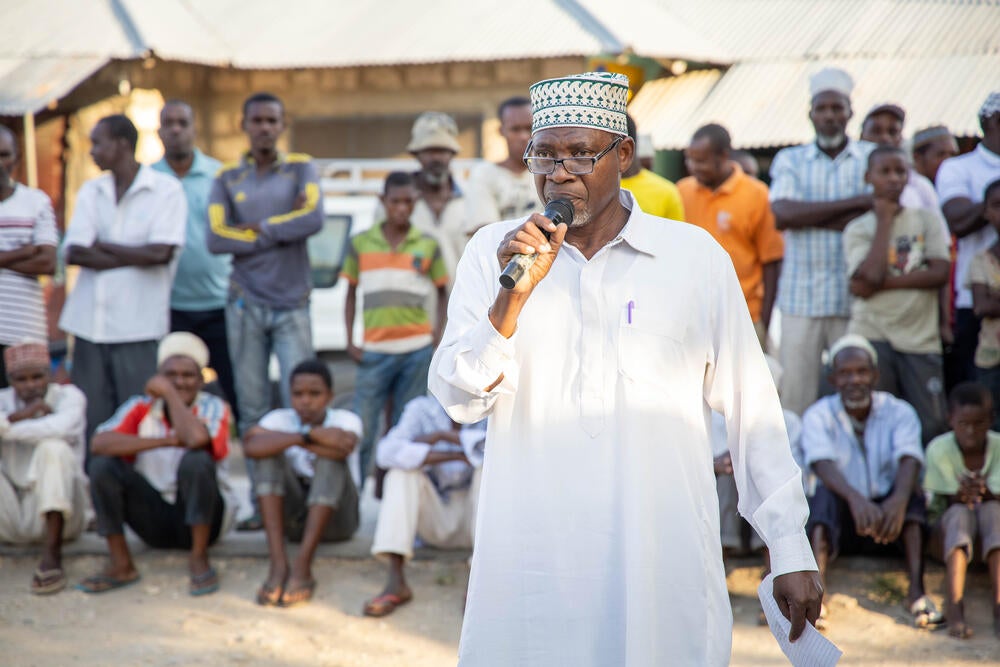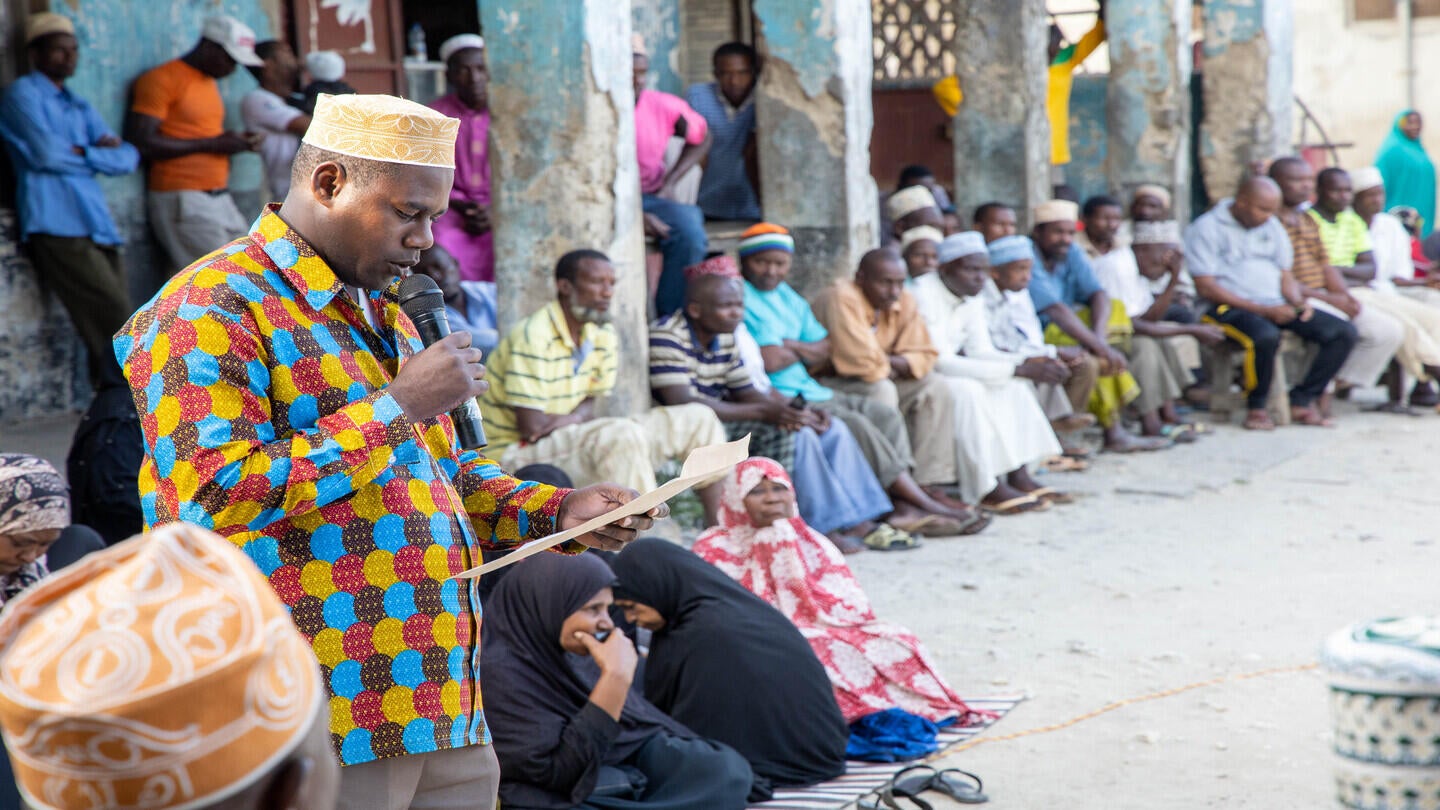Combating Child Marriage through inter-generational dialogue and men engagement:
In many regions of Tanzania, including Zanzibar’s Madungu Ward in Pemba South, child marriage and gender-based violence continue to be critical challenges. However, a growing movement is emerging—one that is powered by proactive leaders, men, and boys who are committed to driving change. Yahya Kombo, the Acting Sheha of Madungu, is one such leader who has taken a bold stand against these harmful practices.
His journey of transformation began with a training on intergenerational dialogues organized by HelpAge Tanzania under the Chaguo Langu Haki Yangu programme, which is implemented by UNFPA and funded by the Government of Finland. The training equipped Yahya with knowledge about child marriage and GBV. It focused on the vital role of men, boys, and community leaders in ending these practices in Zanzibar, which inspired him to take action within his community.
In May 2024, Yahya found himself in the middle of a family crisis. Late one Wednesday night, a distressed mother approached him with a serious concern. Her daughter, Saidat, had been out late with a boy, Yasir, and the mother feared their relationship would lead the young girl into early marriage.
After speaking with Saidat, Yahya learned that the girl, who had once been focused on her education, was now considering marriage, influenced by her relationship with Yasir. Yahya knew that this was a dangerous shift—one that could drastically alter the course of her life.
“I explained to her the importance of education and how an early marriage could derail her dreams, leaving her unprepared for the challenges of adult life,” Yahya recalled.
He also advised the girl’s family to engage in an open dialogue to discuss the future and the importance of delaying marriage until the children had completed their secondary education.
The conversation took a more complicated turn when, two days later, Yahya learned that Yasir’s mother supported the idea of marriage. She suggested that her son, still under 18, could leave school and work with his elder brother to provide for his future wife. Similarly, Saidat’s mother seemed to believe marriage was the best option for the young couple, given their relationship.
Yahya, however, was resolute. Recognizing the broader implications of early marriage—teenage pregnancies, health complications, and limited future job and economic opportunities—he convened a meeting with both families. During the meeting, Yahya strongly emphasized that marriage should not be an option for children still in school.
“As a Sheha, I will not allow the marriage of your children. They are still too young and need to finish at least their secondary education before taking on adult responsibilities,” Yahya asserted firmly.
Despite his compelling arguments, the mothers remained unmoved. With tensions rising, Yahya escalated the matter to involve other family members—Yasir’s father and Saidat’s uncle—hoping their influence could bring a different perspective.
To Yahya’s relief, both men supported his stance. They agreed that the children should continue their education and put off marriage plans for now. However, Yasir’s mother remained opposed to his son living with his dad to enable them to complete his education, whom she described as abusive.
Yahya didn’t back down. He worked with the family to find solutions, offering support through social welfare officers and the police to address the allegations of abuse.
“The children have the right to education, and as a government official, I am committed to ensuring that right is protected,” he declared.
With the support of Yasir’s mother to ensure his educational needs were met and Saidat’s family agreeing to prioritize her schooling as well, Yahya successfully helped them continue their education. He also ensured that the school regularly updated the children’s progress and attendance to ensure they stayed on track and did not drop out.
Today, Saidat and Yasir are both back in school, and their futures are brighter— thanks to the intervention of a determined community leader.
Yahya Kombo’s story is a powerful testament to the critical role that male leaders play in addressing child marriage and gender-based violence. Through his unwavering commitment to education and the protection of children’s rights, Yahya has helped two young individuals avoid the pitfalls of early marriage and set a powerful example for others in his community.

In a society where traditional gender norms often hinder progress, Yahya’s efforts underscore the transformative power of community engagement and men’s leadership in advancing gender equality and protecting the rights of children to education and protection from child marriage. His actions show that when leaders stand up for girls' rights and gender equality, they can transform lives and create lasting social impact.
Yahya Kombo’s leadership is not just about preventing child marriages; it is about giving young people the tools to build a brighter, more prosperous future.
The ‘Chaguo Langu Haki Yangu - My Rights My Choices: Protecting the Rights and Choices of Women and Girls, particularly Women and Girls with Disabilities in Tanzania’ Programme (hereinafter the Programme) is a three-and-a-half-year programme (2021-2025) implemented by UNFPA, the United Nations sexual and reproductive health agency, and funded by the Government of Finland.
--
Media Inquiries:
Dr. Warren Bright,
UNFPA Communications Analyst,
United Republic of Tanzania
Mobile: +255 764 43 44 45
Email: bwarren@unfpa.org


